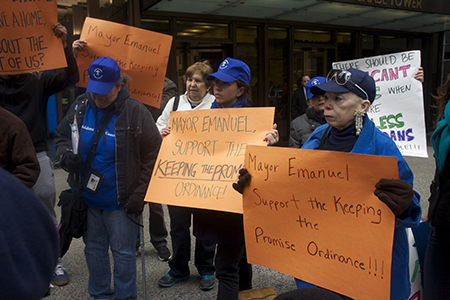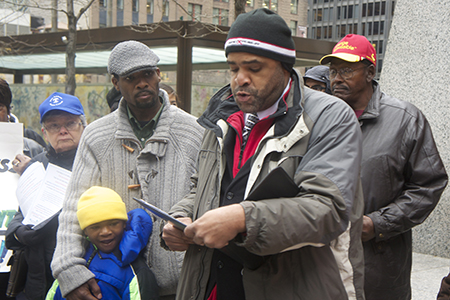
CHICAGO–Using CTA Blue Line seats as a bed is something that Arthur Barton vividly remembers. Living on the streets for 10 years required him to make decisions that would keep him safe and warm during the winter. Last year he was taken in by an organization and now he has an apartment and a job, but he said he will never forget the past. When you’re homeless, the struggle is daily, he said.
“It’s like war so you take cover as best as you can and let your survival instincts kick in when things get hard, they kicked in for me,” Barton said.
As the weather gets colder and the holidays approach, more people are becoming concerned about the homeless. Advocates are urging the Chicago Housing Authority to distribute more housing vouchers to help get people off the streets and into affordable housing of their own.
A recent study from Renaissance Social Services found that there are more than 7,000 homeless in Chicago. Of that 7,000, more than 1,200, 17 percent, live on the streets because the homeless shelters are overcrowded. Until Renaissance Social Services came along, Barton was one of those people.
Racial demographics are no longer included by cities in the U.S. Conference of Mayors’ survey so the last racial breakdown down by the City of Chicago was in 2007. According to the Chicago Coalition for the Homeless, the survey found that 75 percent of the homeless population was African American, 16 percent white, 6 percent Latino and 3 percent other. Chicago Public Schools found that 98 percent of its homeless students were of color for the 2013-2014 academic year.
Executive Director Michael Banghart said that more prevention services and affordable housing need to be offered in Chicago to keep people from losing their homes and off the streets. The organization’s team recently helped 425 households with prevention services, housing and supportive services.
“We know comprehensive assistance is essential,” he said. “There are reasons people become homeless and all the issues must be addressed, as well as prevention programs put in place to make sure homelessness is addressed, Banghart said.”
Linda Diaz lives in a homeless shelter in Lincoln Park and said she tried desperately to hold onto the home her mother left her before she passed, but it became too difficult to keep up with the rising property taxes.
“After awhile I realized that it was pretty hard to maintain a building that needed upkeep, everything was falling apart,” she said.
“I didn’t have my father’s carpentry skills or the money to pay for fixing it up,” Diaz said, who found herself staying with friends before she found a temporary home at the shelter she currently stays at.
It has been nine months and Diaz said she is ready to get her own place again. She misses the privacy. The agency decided to release 3,000 additional vouchers by the end of the year, but Diaz wants CHA to release more so people like herself can have an affordable place to stay.
Diaz and other housing advocates’ dissatisfaction towards CHA has grown, especially since a July report by a research group found that the agency did not release as many vouchers as it was able to do. The Center for Tax and Budget Accountability reported that between 2008 and 2012, CHA had enough funding to distribute more housing vouchers than it did. On average, the agency was capable of giving out an additional 13,534, but it used the funding for other purposes.
CHA opened its Family Public Housing Waitlist in 2010 and its Housing Choice Voucher list in 2008. To date, more than 245,000 have registered for the 2014 Waitlist Lottery Registration. The agency won’t have an idea of how many new households from its waitlist will be placed into housing in 2015 until after the lottery. That takes place by a third-party vendor in early 2015.
With hundreds still on waitlists, this might seem wrong, but CHA hasn’t done anything illegal. CHA spokeswoman Wendy Parks said that the agency participates in a federal program called “Moving to Work,” which allows the agency to allocate where they want certain funds to go.
“As a Moving To Work Public Housing Agency, CHA has the flexibility to combine [Moving to Work] sources of funding for public housing and [Housing Choice Vouchers] programs into a single fund,” Parks said in an email.
This authority allows for CHA to allocate its funding annually based on agency priorities and other goals, Parks said. So if more funding is being directed to one area, another area will automatically lose some of it’s funding. Parks said that CHA has made decisions in the past to use some voucher funding for development and residents services activities.
Housing advocates and CHA residents aren’t pleased with CHA’s authority and want to see some changes. Rod Wilson, executive director of Lugenia Burns Hope Center said that there needs to be more accountability and transparency.

One solution to lowering the homeless population is for City Council to pass a proposed ordinance, which already has the support of 23 aldermen. Protestors stood outside a charity breakfast to help end homelessness last month. Mayor Rahm Emanuel attended the annual event and some of the protesters said that if he really cared about the issue, he would hold CHA more accountable.
Messages to the mayor’s office were not returned.
The Keeping the Promise Ordinance would give the City Council oversight authority over CHA.
CHA would have to report to the City Council Committee on Housing and Real Estate about vacant public housing, unused vouchers and surplus revenue. The ordinance would also require the housing agency to meet certain performance standards before the agency could receive additional housing funds.
Passing this ordinance would ensure that council members and the public are able to hold CHA accountable.
Parks said that the agency will begin publishing quarterly reports for the public on its website by end of the year.
“The quarterly report will include key information such as unit delivery progress, capital expenditures, and a host of other information,” she said.
Wilson said that CHA just wants to do that so no one can question their decisions.
“They do not want anything that’s going to have teeth on it, they don’t want any accountability,” he said.
“Someone has to oversee them and if the mayor is not going to do it, the City Council needs to do it,” Wilson said.
